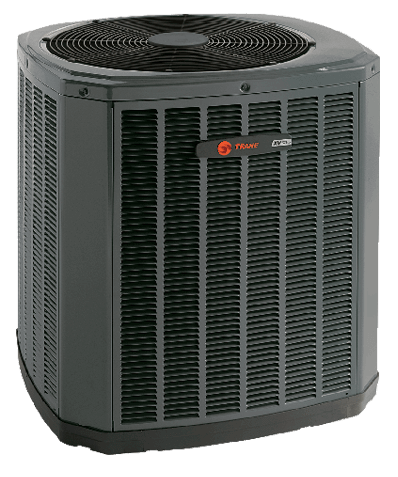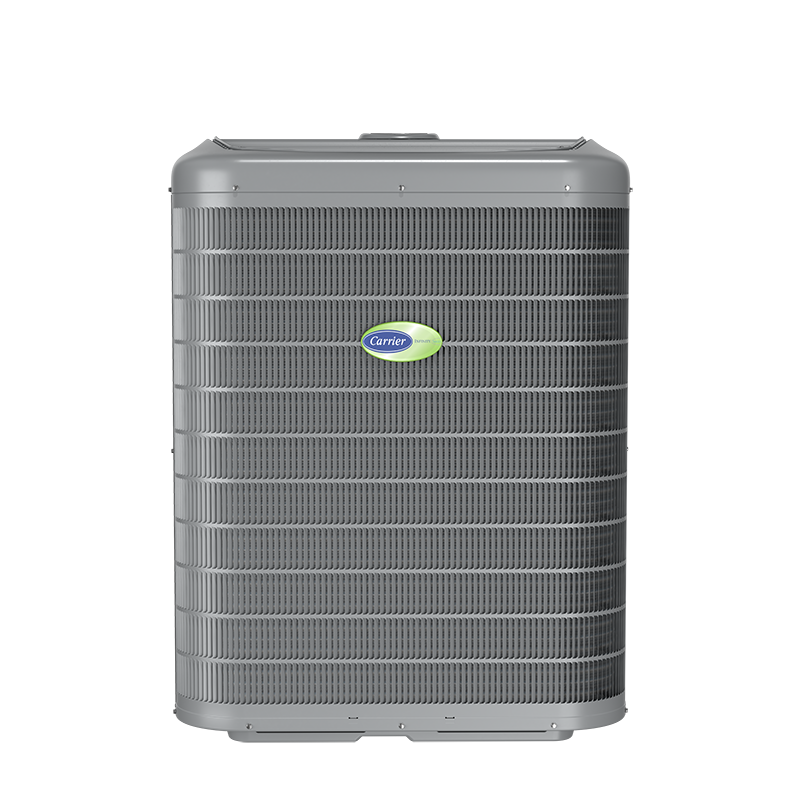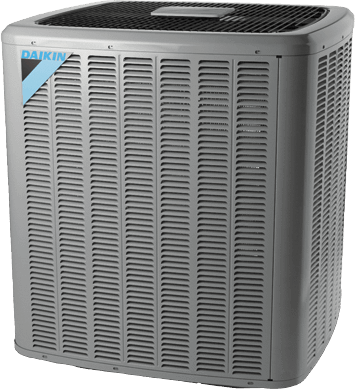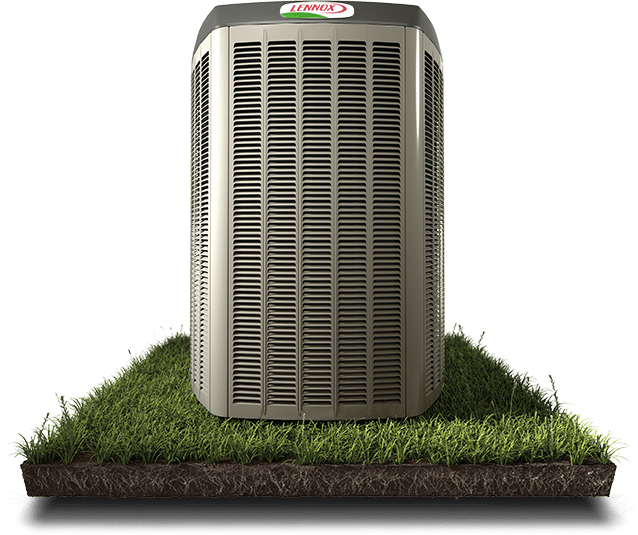Heat pump technology offers several advantages over traditional air conditioners, resistance heaters, and combustion furnaces.

In cooling mode, heat pumps offer the same efficiency as the best air conditioners on the market.
In heating mode, heat pumps are 2-4 times more efficient than resistance heaters, and they can match the operating cost of gas heaters without the associated CO2 emissions from combustion.
- A central heat pump can help you save on equipment and installation costs, since space heating and air conditioning are being combined into a single system.
- Thanks to the Inflation Reduction Act, you can also claim a $2,000 federal tax credit when installing a new heat pump system.
A central heat pump can achieve even greater energy savings if you combine it with a solar panel system, so that the energy consumption can be offset by solar power generation. This is not a combination you can achieve with traditional furnaces since you cannot offset fuel consumption (whether it be natural gas, propane, or oil) with electricity generation.
If you’re looking for a central heat pump that offers high efficiency and top performance, the best starting point is the ENERGY STAR Most Efficient List.
In this buying guide, we will review some of the best heat pump models that are featured on the Energy Star Most Efficient list, and the typical operating costs you can expect when using them.
How Is the Energy Efficiency of Central Air Heat Pumps Measured?
Before we delve into the top heat pump brands and models, there are two important efficiency metrics to call out:
- Seasonal Energy Efficiency Ratio (SEER) – Heat pump efficiency in cooling mode.
- Heating Seasonal Performance Factor (HSPF) – Heat pump efficiency in cooling mode.
In simple terms, the SEER tells you the cooling BTU/h obtained per watt of electricity input, while the HSPF tells you the heating BTU/h per watt of electricity.
For example, a SEER 25 value means you get 25,000 BTU/h of cooling for every kilowatt of power consumed, while a HSPF 14 value indicates 14,000 BTU/h of heating for every kilowatt.
Having discussed the meaning of the SEER and HSPF values, we will review four central heat pump models that are currently featured on the ENERGY STAR Most Efficient List.
To qualify for the ENERGY STAR label, a central heat pump must have at least SEER 15 efficiency in cooling mode. The minimum heating efficiency is HSPF 8.5 for split systems, and HSPF 8.2 for single-package systems.
Did You Know? Cold winter weather forces heat pumps to work harder, which means the cooling efficiency for a given model will be generally higher than the heating efficiency. You might find a heat pump with SEER 25 and HSPF 14 efficiency, like in the example above, but not a unit where the SEER and HSPF are equal.
Top Four Most Efficient Models
AirEase SHP/BCE Series
The AirEase SHP/BCE heat pump series ranges from 23,000 to 56,500 BTU/h of capacity, and it offers up to SEER 20 cooling efficiency and up to HSPF 10 heating efficiency.
- AirEase SHP heat pumps can operate at variable capacity, adjusting their heating output according to demand instead of switching between full output and zero output.
- These heat pumps can also be paired with a variable-speed furnace as a backup in case you live in a region with harsh winters that demand additional heating.
ENERGY STAR provides the typical annual consumption of the AirEase SHP/BCE series, and their percentage savings with respect to the federal efficiency baseline.
We have also estimated annual operating costs using an electricity price of 15.46 cents/kWh, the US average electricity prices according to the latest data from the Energy Information Administration:
| AirEase SHP System Capacity | Annual Consumption (kWh) | Percentage Savings | Annual Operating Cost |
| 23,000 BTU/h | 1,850 kWh | 30% | $286 |
| 34,000 BTU/h | 2,734 kWh | 30% | $423 |
| 48,000 BTU/h | 3,989 kWh | 27% | $617 |
| 56,500 BTU/h | 4,759 kWh | 26% | $736 |
You can achieve even greater performance by using the ComfortSync A3 Thermostat, which comes with a smartphone application. This smart thermostat can monitor indoor temperatures and adjust heat pump performance, accordingly, providing comfort while saving energy.
The thermostat can also detect malfunctions and other system issues, providing automatic notifications when the AirEase SHP needs maintenance or repairs.
Carrier 25VNA4 Infinity Series

The Carrier 25VNA4 Infinity Series is one of the most efficient product lines in the market, reaching up to SEER 24 and HSPF 13. For comparison, most high-performance central heat pumps operate at around SEER 20 and HSPF 10 efficiency.
Carrier 25VNA4 Infinity heat pumps achieve their superior efficiency thanks to a combination of the following design features:
- Carrier’s Greenspeed Intelligence system, which improves comfort and humidity control while enhancing energy efficiency.
- The outdoor condenser unit is combined with variable-speed fan coils, which are capable of controlling airflow according to heating and cooling needs. The unit achieves superior efficiency thanks to the synergy between condenser controls and air handler controls.
The following table summarizes ENERGY STAR performance data for Carrier 25VNA4 Infinity heat pumps at four capacity ratings:
| Carrier 25VNA4 System Capacity | Annual Consumption (kWh) | Percentage Savings | Annual Operating Cost |
| 24,000 BTU/h | 1,549.4 kWh | 44% | $240 |
| 34,600 BTU/h | 2500.4 kWh | 37% | $387 |
| 45,500 BTU/h | 3402.4 kWh | 35% | $526 |
| 58,500 BTU/h | 4383.5 kWh | 35% | $678 |
Carrier 25VNA4 heat pumps can be combined with the Infinity Touch smart control to achieve greater comfort and energy efficiency. A single Infinity Touch can control temperature, humidity, and ventilation in up to eight different zones.
Daikin DZ20VC Series

Daikin is another leading heat pump manufacturer, and their DZ20VC series offers an efficiency of up to SEER 21 and HSPF 10.
- These heat pumps achieve high efficiency thanks to their variable-speed inverter compressors, which are combined with the Daikin Inside Intelligence system.
- Condenser unit fans are driven by electronically commutated motors (ECM), which offer speed control and higher efficiency than other motor types.
- They also have built-in diagnostics, detecting any performance issues and generating alerts to ensure the system gets maintenance.
Daikin also offers indoor air handlers with variable-speed motors, which are controlled along with the outdoor unit for greater efficiency. DZ20VC heat pumps can also be combined with high-efficiency furnaces from Daikin in case you need extra heating for the coldest winter days.
There is no need for a separate air handler when combining a heat pump and furnace since the blower fan is included as part of the furnace.
ENERGY STAR provides performance data for DZ20VC heat pumps of several capacities, which is summarized in the table below:
| Daikin DZ20VC System Capacity | Annual Consumption (kWh) | Percentage Savings | Annual Operating Cost |
| 23,400 BTU/h | 1835.2 kWh | 32% | $284 |
| 35,400 BTU/h | 2776.3 kWh | 32% | $429 |
| 46,500 BTU/h | 3739.8 kWh | 30% | $578 |
| 52,500 BTU/h | 4222.3 kWh | 30% | $653 |
DZ20VC heat pumps achieve top performance when controlled by smart thermostats such as the Daikin One+ and ComfortNet. These thermostats have built-in automatic functions that are designed to improve comfort and efficiency.
Lennox XP25 Series

The Lennox XP25 Series reaches up to SEER 22 and HSPF 10 efficiency. This heat pump line is characterized by its accuracy, controlling temperature within 1% of the thermostat setting.
- The Lennox XP25 series can operate with variable capacity, according to the heating and cooling requirements of your home throughout the year.
- These heat pumps are also characterized by their quiet operation, generating 50% less noise than a standard central heat pump.
The ENERGY STAR performance data for the Lennox XP25 series is provided below:
| Lennox XP25 System Capacity | Annual Consumption (kWh) | Percentage Savings | Annual Operating Cost |
| 22,800 BTU/h | 1746.6 kWh | 33% | $270 |
| 34,400 BTU/h | 2665.8 kWh | 32% | $412 |
| 48,000 BTU/h | 3824.2 kWh | 30% | $591 |
| 58,000 BTU/h | 4683.4 kWh | 29% | $724 |
Lennox also offers the iComfort S30 Ultra-Smart Thermostat, which uses WiFi connectivity to improve temperature control and energy efficiency. Like most central heat pump models, the Lennox XP25 can operate alone with an indoor air handler or combined with a gas furnace.
How Much Does a Central Heat Pump System Cost?
The cost of a heat pump installation can vary widely depending on the size of your home, the number of zones, and the rated efficiency of the system. You can expect to pay more as the rated BTU/h output increases, and if you want a unit with high SEER and HSPF values.
You can expect to pay between $13,400 and $18,200 when installing a central heat pump system. If you combine a heat pump and furnace for increased heating capacity, the average price range increases slightly to $16,500 – $18,700. The price difference between both configurations is small:
- A stand-alone heat pump requires an air handler.
- A heat pump + furnace combo does not require a separate air handler since this device is already included as part of the furnace.
- Most central heat pump models are designed for both configurations: stand-alone heat pump + air handler or heat pump + furnace combo.
Central heating and cooling systems can be installed for less than $10,000 when saving money is the goal (assuming proper ductwork and everything is already in place). But, for those looking to install a top-tier central heat pump, your upfront cost can increase to around $18,000.
While your upfront cost may be high, your combined gas and electricity savings can range from $1,000 to $2,000 per year. Assuming average savings of $1,500 per year, the cost difference of $8,000 is recovered in only 5.3 years.
Pro Tip: Before installing a central heat pump, get a home energy audit to identify and correct any insulation and air leakage issues. If you increase the insulation level and seal air leaks first, your new heat pump will have a much lower workload, and your energy savings will be greater.
Comparing Central vs Ductless Mini-Split Heat Pumps
Air-source heat pumps are available in central and mini-split configurations. Central heat pumps have an air handling unit connected to a duct system, which distributes cool and warm air throughout your home.
On the other hand, mini-split heat pumps have their refrigerant lines connected directly to indoor evaporator units, with no ducts involved.
In general, ductless HVAC systems are more efficient than ducted systems, and this is reflected in heat pump specifications.
- Most central heat pumps are at around SEER 20 and HSPF 10 efficiency, but you can find mini-split heat pumps offering SEER 30+ and HSPF 14 efficiency.
- This means you can achieve even greater energy savings with ductless heat pumps.
However, installing a mini-split heat pump for a home with multiple rooms (aka zones) can get expensive: you can expect to pay between $3,600 and $8,000 for a single-zone mini split system, but the costs will add up quickly in a home with multiple rooms/zones.
In general, central heat pumps are more cost-effective in homes that need uniform heating and cooling throughout the year. Ductless mini-splits may be a better option if your home has rooms that are often empty, since you can optimize the localized heating and cooling for occupied areas.